A proposed NT$2.4 billion (US$75.08 million) dental care fund for remote healthcare would only benefit students trained overseas and affect the rights of local students and practitioners, New Power Party (NPP) Legislator Claire Wang (王婉諭) said yesterday.
The Ministry of Health and Welfare earlier announced the second phase of a program to improve medical services in underserved areas in line with President William Lai’s (賴清德) “healthy Taiwan” policy, with NT$2.4 billion allocated to subsidize dental services.
Wang and Taiwan Dentist, an alliance of local dental groups, at the Legislative Yuan, said the program would undermine dental education and the industry in favor of students with foreign degrees.
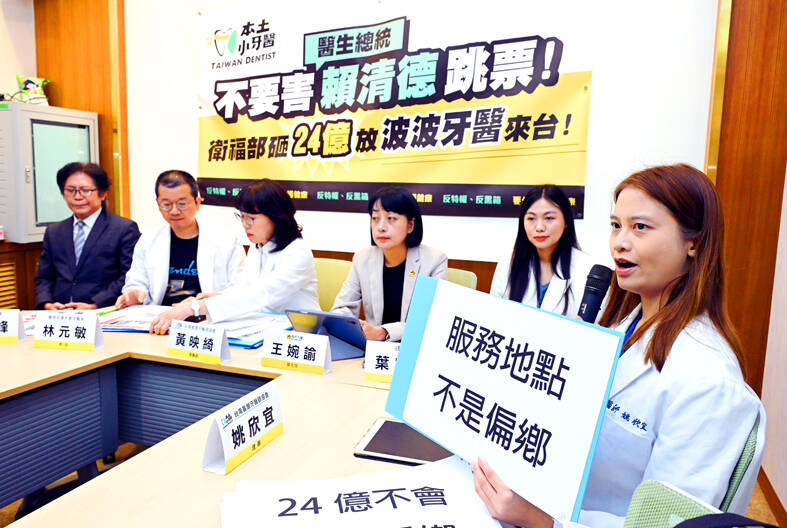
Photo: Liao Chen-huei, Taipei Times
It is necessary to enhance healthcare services in remote areas, but resource allocation would be adversely affected if the program is not properly implemented, she said.
The NT$2.4 billion would be accessible to those with foreign degrees, even though they did not undergo an internship and obtain a license, National Yang Ming Chiao Tung University Department of Dentistry professor Lin Yuan-min (林元敏) said.
The program’s key performance indicators evaluate the number of trainees instead of the number of patients served, without rules on length of service, service content and defaulting punishment, raising suspicions that it was designed to expedite local dental licensure for students holding foreign degrees under the guise of a remote healthcare program, he said.
The teaching workforce in hospitals has been stretched due to additional training for 50 students with foreign dental degrees, and the teaching quality could worsen if there were more of them to train, which would adversely affect dental patients, he said, adding that one in every five new dentists would be those with a foreign degree if the number of trainees doubles.
Kaohsiung Dental Association director Tsai Cheng-feng (蔡政峰) said the ministry did not discuss with medical practitioners in remote areas before it established the program, and that dentist-patient ratios should not be the sole concern, as areas face different issues.
For example, medical service sites are the most effective solutions for outlying islands and mountainous townships, and long-term financial incentives should be provided to retain dentist staff in underserved areas, he said, adding that a short-term workforce such as interns would damage the local dental service system.
An amendment to the Physicians Act (醫師法) in 2022 did not curb the number of dentists holding foreign degrees, as it exempted those with five-year work experience overseas from the foreign degree accreditation exam, Taiwan General Dental Practitioners Association director Huang Ying-Chi (黃映綺) said.
The ministry would accelerate local licensure for dental students with foreign degrees if it increases their intern number via the program, she said.
A petition protesting the “fake remote healthcare program” on the Public Policy Online Participation Network Platform accumulated more than 5,000 signatures within two weeks, but the ministry still refuses to communicate with frontline practitioners, Huang said.
She said her association demands that the program exclude dental students without a license and allow only practitioners with a license to apply for the subsidy.
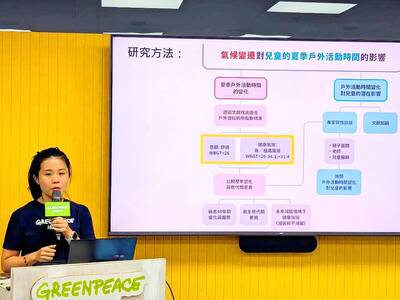
The government should improve children’s outdoor spaces and accelerate carbon reduction programs, as the risk of heat-related injury due to high summer temperatures rises each year, Greenpeace told a news conference yesterday. Greenpeace examined summer temperatures in Taipei, New Taipei City, Taoyuan, Hsinchu City, Taichung, Tainan and Kaohsiung to determine the effects of high temperatures and climate change on children’s outdoor activities, citing data garnered by China Medical University, which defines a wet-bulb globe temperature (WBGT) of 29°C or higher as posing the risk of heat-related injury. According to the Central Weather Administration, WBGT, commonly referred to as the heat index, estimates
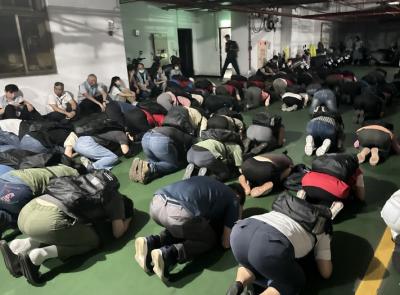
Taipei and other northern cities are to host air-raid drills from 1:30pm to 2pm tomorrow as part of urban resilience drills held alongside the Han Kuang exercises, Taiwan’s largest annual military exercises. Taipei, New Taipei City, Keelung, Taoyuan, Yilan County, Hsinchu City and Hsinchu County are to hold the annual Wanan air defense exercise tomorrow, following similar drills held in central and southern Taiwan yesterday and today respectively. The Taipei Mass Rapid Transit (MRT) and Maokong Gondola are to run as usual, although stations and passenger parking lots would have an “entry only, no exit” policy once air raid sirens sound, Taipei
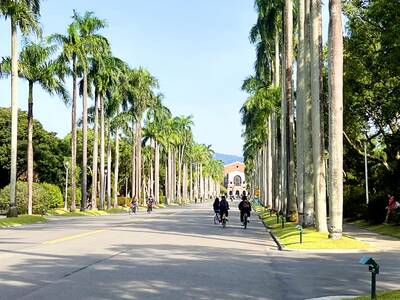
Taipei placed 14th in the Quacquarelli Symonds (QS) Best Student Cities 2026 list, its highest ever, according to results released yesterday. With an overall score of 89.1, the city climbed 12 places from the previous year, surpassing its previous best ranking of 17th in 2019. Taipei is “one of Asia’s leading higher-education hubs,” with strong employer activity scores and students “enjoying their experience of the city and often keen to stay after graduation,” a QS staff writer said. In addition to Taipei, Hsinchu (71st), Tainan (92nd), Taichung (113th) and Taoyuan (130th) also made QS’ list of the top 150 student cities. Hsinchu showed the
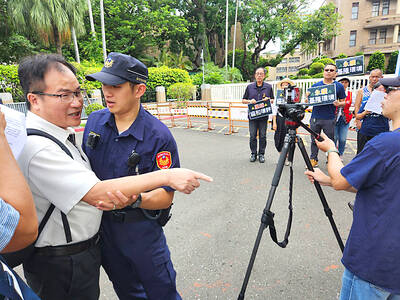
Environmental groups yesterday filed an appeal with the Executive Yuan, seeking to revoke the environmental impact assessment (EIA) conditionally approved in February for the Hsieh-ho Power Plant’s planned fourth liquefied natural gas (LNG) receiving station off the coast of Keelung. The appeal was filed jointly by the Protect Waimushan Seashore Action Group, the Wild at Heart Legal Defense Association and the Keelung City Taiwan Head Cultural Association, which together held a news conference outside the Executive Yuan in Taipei. Explaining the reasons for the appeal, Wang Hsing-chih (王醒之) of the Protect Waimushan Seashore Action Group said that the EIA failed to address